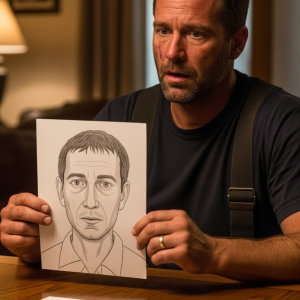My world was four white walls, the scent of antiseptic, and the kind, worried face of my husband, David. My name, he told me, was Jane. I had no reason to doubt him. I had no reason to doubt anything, because my mind was a blank, white canvas, as smooth and featureless as the walls of my room.
The story he told me was a tragedy. A horrific car crash on a rain-slicked road. A fire that had consumed our car and, with it, our past. He had pulled me from the flames, but the trauma had stolen my memories. Every face, every place, every moment of my life before I woke up here, was gone. David was my only anchor in a sea of nothingness.
He was a perfect husband, a saint of a man. He sat by my bedside for hours every day, patiently recounting stories of “our” life together. He spoke of a small cottage by a lake, of trips to Italy, of a shared love for old black-and-white movies. The stories were beautiful, but they felt like descriptions of a stranger’s life. There were no photographs, no mementos. “Everything was in the car, my love,” he would say, his voice thick with a sorrow that seemed bottomless. “The fire took it all. But it doesn’t matter. We’re together. We can make new memories.”
But at night, when the sterile quiet of the room deepened, the blank canvas of my mind would be slashed with color and noise. I had nightmares. Not memories, but visceral, terrifying fragments. The smell of rain and something else, something metallic like old pennies. The feeling of being trapped in suffocating darkness. A scream, high and piercing, that I wasn’t sure was my own.
When I would wake up, gasping and drenched in sweat, David would be there to hold me. “It’s just the trauma, Jane,” he’d soothe, stroking my hair. “The echo of the crash. It will fade with time.”
He was fiercely protective of my recovery. He explained that my “friends and family” were respecting the doctor’s orders to give me space, that reintroducing too much of the past too soon could cause a dangerous psychological shock. He vetted every nurse, watched every doctor with a hawk-like intensity. His devotion was absolute, a wall of care built around me. It was only much later that I realized it wasn’t a wall to keep the world out; it was a wall to keep me in.
The crack in my perfect, white world appeared in the form of a rumpled, weary-looking man in a trench coat that had seen better decades. He introduced himself as Detective Miller. David was instantly on his feet, his body physically blocking the doorway, his voice tight with a sudden, sharp anxiety that I had never seen before.
“I’m sorry, Detective, but my wife is not up for visitors,” David said, his hand on the doorframe. “Her doctors have been very clear. She needs absolute rest. No stress.”
The detective’s gaze drifted past David’s shoulder and settled on me. His eyes were a pale, washed-out blue, but they seemed to see right through the placid, confused facade I presented to the world. He didn’t raise his voice. He didn’t need to. His quiet authority filled the room.
“This isn’t a social call, Mr. Thorne,” he said, his voice a low, gravelly rumble. He then looked directly at me, and it felt as if he was speaking to a person who had been asleep for a very long time. “Hello, ma’am. My name is Detective Miller. I don’t know what this man has been telling you, but your name is not Jane.”
The air in the room seemed to thin, become difficult to breathe. David’s face was a mask of fury. “That’s enough! I’m going to call security!”
Miller ignored him completely, his eyes never leaving mine. “Your name is Abigail Parker,” he said, each word a carefully placed stone, building a bridge to a past I couldn’t access. “You’ve been registered as a missing person for the past six months. Ever since the night your husband, Richard Parker, was murdered in your home.”
Murdered. The word was a gunshot in the silent room. My mind reeled, a kaleidoscope of confusion and a terrifying, nascent flicker of something else. Something buried.
The detective took a step closer, his voice dropping, becoming more serious. “The official story of your life, the one this man has constructed, ends here. Your real life, the one with your real husband, ended in a violent home invasion. An invasion you survived.”
He paused, letting the weight of his words settle. Then, he delivered the final, devastating blow. The one that didn’t just crack my world, but shattered it into dust.
“And there’s one more thing you need to know, Mrs. Parker,” he said, his voice now laced with a cold, professional steel. “Given that you vanished from a crime scene with your husband’s business partner, Mr. David Thorne, and that a significant amount of money was transferred out of your joint accounts the next day, you are currently the one and only suspect in your husband’s murder.”
He looked from my stunned face to the now-ashen, terrified face of the man beside me. “So, Abigail,” he asked, his voice deceptively gentle. “Can you tell me where you were on the night your husband was killed?” In that instant, I was no longer a patient. I was a victim, a prisoner, and now, a suspect, trapped in a room with the man who had stolen my life and the man who was threatening to take what was left of it.
The detective’s words were a key, unlocking a door in the deepest, darkest basement of my mind. It didn’t flood with light; a single, terrifying image bled through. A man’s face, contorted in a silent scream, the glint of something metal, the sound of a sickening thud. It was gone as quickly as it came, leaving me trembling and breathless. It was a memory. My first.
When Detective Miller left, promising to return, David’s carefully constructed composure crumbled. He paced the room, his movements frantic, his loving demeanor replaced by a raw, naked panic. He tried to explain it all away, that the detective was a confused, incompetent fool chasing a bogus theory, that I was the victim of a terrible mistake. But I wasn’t listening to his words. I was watching his eyes. They were the eyes of a cornered animal.
I knew, with a certainty that defied my absent memory, that David was lying. I knew he was dangerous. And I knew that the police, my only potential saviors, saw me as a killer. I was utterly, terrifyingly alone, adrift between the monster I was living with and the law that was hunting me.
A cold, clear survival instinct rose through the fog of my confusion. I had only one weapon: his belief that my mind was a blank slate. So I played the part. I cried. I feigned a hysterical, confused panic. “A suspect? Murder? David, I don’t understand! Who is Richard? I don’t know anyone by that name! I was in a car crash with you!”
It worked. I watched the tension drain from his shoulders, his panic replaced by a grim resolve. He saw me not as a threat, but as a pawn he still controlled, a broken tool he just needed to fix. He became more attentive than ever, a jailer polishing the bars of his cage.
But I was no longer a passive prisoner. I was a spy in my own life. I began to watch him, to analyze his every move, his every word, searching for cracks in his story. The opportunity came in the form of a kind, no-nonsense night nurse named Maria. I sensed a quiet strength in her, a decency that felt real.
One night, while David was out of the room making a phone call, I scribbled a note on a piece of tissue with a stolen pen. “He is lying. My life is in danger. Give this to Detective Miller. Trust no one else.” As Maria came to check my vitals, I pressed the wadded-up tissue into her hand, my eyes pleading with her. She looked from the note, to me, and then to the door, and gave a single, almost imperceptible nod. The first thread of an alliance had been woven in the dark.
My secret correspondence with Miller, passed through the quiet courage of Nurse Maria, began to shape a desperate plan. Miller’s notes were brief, instructional. “He thinks you’re his puppet. Use it. Make him pull the strings. We need him to talk.”
The next phase of my performance began. I started to “remember.” Not the truth, but pieces of the lie David had so carefully constructed. I would tell him about flashes of memory from the “car crash.” Each detail was a carefully placed bait, designed by Miller and me to make David nervous, to make him feel his control over my memory slipping.
“David,” I said one afternoon, my voice trembling with feigned confusion. “I had another nightmare. The crash… I remember another car. The headlights were so bright. It was a blue truck. Was it a blue truck that hit us?”
I saw the flash of panic in his eyes before he quickly masked it. “No, no, Jane, my love,” he said, his voice a little too smooth, a little too quick. “You’re getting confused. The doctors said this would happen. There was no other car. It was just us. The road was slick from the rain, remember? We just… we lost control. It was a tragic, simple accident.” He was desperate to erase the ghost of a second car. That was the key.
The final trap was set a week later. Maria, on Miller’s instruction, told David that a new, experimental memory-recovery therapy was being considered for me. A specialist would be coming to evaluate me. The news sent David into a controlled spiral. He knew that if my real memories returned, his life was over. He had to reinforce his lie, to cement the false narrative in my mind before anyone else could get to me.
That evening, he sat by my bed, his demeanor grave. I had a new accessory, a small gift from Maria—a digital audio recorder, no bigger than a button, clipped to the collar of my hospital gown.
“Jane,” he said, taking my hands. “We need to talk. Before this new doctor comes. I need you to be strong. I need you to remember the truth.”
I looked at him, my eyes wide with a practiced innocence. “But it’s all so fuzzy, David… The crash… the fire…”
This was his moment, his last chance to be the director of my reality. And in his supreme arrogance, he took the bait. “Forget the crash,” he said, his voice a low, intense whisper. “There was no crash. Do you understand me? That’s just a story for the doctors. A story to protect you. To protect us.”
He leaned closer, his eyes burning with a feverish intensity. “Richard was out of control. He was going to ruin us both with his gambling debts, his threats to go to the police about our business. It was a robbery, Jane. A simple robbery that went wrong. He fought back. It was self-defense. You saw it. You were there. He came at me, and you were screaming… You fell and hit your head. It was chaos. But there was no murder. There was no other car. Just a tragedy that we survived. Together. That is the story you will tell the doctor. That is the story you will tell everyone.”
He had just confessed. Not to the murder itself, but to the cover-up, to the existence of a violent encounter, to the fact that the car crash was a complete fabrication. He had destroyed his own alibi. He had walked right into the cage and locked the door behind him.
The aftermath was a blur of flashing lights and shouting voices. The detectives, who had been listening in from a nearby room, entered the moment David finished his tirade. His face, when he saw them, was a spectacular ruin of shock and disbelief. The cool, confident manipulator was gone, replaced by a desperate, sputtering man who finally understood he had been outplayed.
With David’s confession on tape, the rest of his story unraveled quickly. His financial records proved the motive. The evidence placed him at the scene of the crime. My name was cleared. The identity of Abigail Parker, suspected murderer, was wiped clean, replaced by the truth: Abigail Parker, survivor.
But Abigail Parker felt like a stranger. Her life, her marriage to Richard, her home—they were all pieces of a puzzle I had no memory of putting together. That life had ended on a cold, rainy night six months ago. The person who had woken up in that white room, the person who had fought her way out of the fog, the person who had looked a monster in the eye and refused to break—her name was Jane.
After the trial, after David was sentenced for the murder of my husband and my own abduction, I was faced with a choice. I could have stepped back into the life of Abigail Parker, a life defined by wealth, tragedy, and a past I couldn’t remember.
Instead, I chose to be reborn. I legally changed my name to Jane. I took a portion of the assets that were rightfully mine and placed the rest in a trust for Richard’s estranged family. I sold the houses, the cars, and every remnant of a life that felt like it belonged to someone else.
I moved to a small, coastal city in Oregon, a place where no one knew my story. I bought a small apartment with a view of the sea. I started over, not as the wife of a murdered millionaire, not as a victim, but simply as Jane. My past was not a ghost that haunted me, but a fire that had forged me into someone stronger. My future was no longer a blank canvas of amnesia, but a clean, empty page, waiting for a story that I, and I alone, would write.




